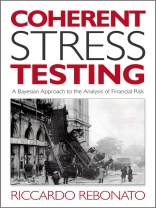In Coherent Stress Testing: A Bayesian Approach, industry
expert Riccardo Rebonato presents a groundbreaking new approach to
this important but often undervalued part of the risk management
toolkit.
Based on the author’s extensive work, research and presentations
in the area, the book fills a gap in quantitative risk management
by introducing a new and very intuitively appealing approach to
stress testing based on expert judgement and Bayesian networks. It
constitutes a radical departure from the traditional statistical
methodologies based on Economic Capital or Extreme-Value-Theory
approaches.
The book is split into four parts. Part I looks at stress
testing and at its role in modern risk management. It discusses the
distinctions between risk and uncertainty, the different types of
probability that are used in risk management today and for which
tasks they are best used. Stress testing is positioned as a bridge
between the statistical areas where Va R can be effective and the
domain of total Keynesian uncertainty. Part II lays down the
quantitative foundations for the concepts described in the rest of
the book. Part III takes readers through the application of the
tools discussed in part II, and introduces two different systematic
approaches to obtaining a coherent stress testing output that can
satisfy the needs of industry users and regulators. In part IV the
author addresses more practical questions such as embedding the
suggestions of the book into a viable governance structure.
Про автора
DR. RICCARDO REBONATO (London, UK) is Head of Front Office Risk Management and Head of the Clients Analytics team at BGM RBS. He is visiting lecturer at Oxford University (Mathematical Finance) and adjunct professor at Imperial College (Tanaka Business School). He sits on the Board of Directors of ISDA and on the Board of Trustees for GARP. He is an editor for the International Journal of Theoretical and Applied Finance, Applied Mathematical Finance, Journal of Risk, and the Journal of Risk Management in Financial Institutions. He holds doctorates in Nuclear Engineering and in Science of Material/Solid State Phsyics. He was a research fellow in Physics at Corpus Christi College, Oxford, UK.












